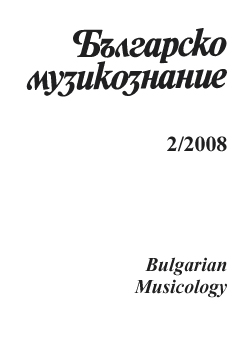Клер Леви: „Етноджазът: локални проекции в глобалното село“
Claire Levy: Ethnojazz: Local Projections in the Global Village
Author(s): Georg KraevSubject(s): Music
Published by: Институт за изследване на изкуствата, Българска академия на науките
Summary/Abstract: Claire Levy is among those scholars whose advanced academic erudition organically complements the inherent musician’s sensitivity. In her new book, the author undertakes a fascinating interdisciplinary journey which reaches a particular meta-level of theoretical perspective concerning the music in the postmodern world. Devoted to ethnojazz as an innovative form of interaction between Bulgarian/Balkan folk and the global jazz vocabulary, the book discusses on the music of emblematic Bulgarian artists with different genre backgrounds, who outline a new trend in music as well as a new horizon in crossing of musical languages. The discussion explores both sociocultural aspects of this phenomenon and its musical “language” distinctiveness, projected in the open, flexible nature of particular musical texts, symptomatic in terms of a specific artistic awareness which goes beyond the blank mimicry in the appropriation of the classic jazz idiom. Their common line, defined by Western analysts as an expression of “Bulgarian exceptionalism”, is often stimulated by the affinity to improvisation in Balkan wedding music, which is now taking new, unpredictable directions. Drawing attention to what is considered nowadays as “returning to ethnicity” or a form of neo-folk attitudes, it is argued that today’s folk musicians update the model of artistic behaviour, not identical neither to the glossy aesthetics of the folk ensembles (promoted by the state after World War Two), nor to the museum-like idea in terms of preserving tradition. The key thesis unfolds the idea that such musicians prompt a new wave of creativity and freedom in re-appropriating the “two sides of the coin” as if to revive the syncretism of that artistic attitudes, which – in jazz as well as in folk – does not split musicians into “composers” and “performers” and turn them into full masters in the process of music-making, or, to put it in another way, in musicking (Small). Part One (The Idea of Ethnojazz) outlines basic points in understanding jazz as a particular novelty in the twentieth century culture. It is argued that jazz has become a broader term that fits a dynamic range of musical practices and may be understood as a context rather than a concept. This starting point is further developed by exploring views of Milcho Leviev – composer, arranger, piano player, and jazz innovator, – who still during the 1960s, the decade before his immigration to the U.S., played a key role in Bulgarian jazz and paved the way for a fusion, named at that time folk-jazz. Part Two (Con Mucho Gusto: the groovy aesthetics in the music of Milcho Leviev) analyses some of the artist’s earliest innovative compositions (Anti-Waltz , Studia, Blues in 9, and Blues in 10). Part Three (The Balkan Ethnic Wave) explores, in a highly polemic way, the controversial local perceptions of the wedding bands boom during the 1980s and its crucial impact on both the dominant sound environment within Bulgaria and the innovative...
Journal: Българско музикознание
- Issue Year: 2008
- Issue No: 2
- Page Range: 160-162
- Page Count: 3
- Language: Bulgarian
- Content File-PDF

